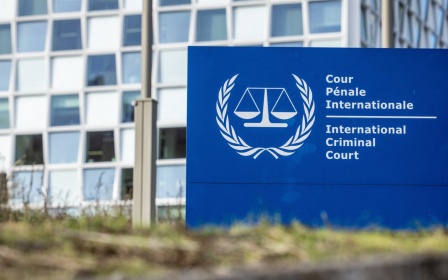Why experts say Netanyahu has no immunity before ICC as France claims

France's claim that Israel's Prime Minister Benjamin Netanyahu is "immune" from international arrest after a warrant was issued by the International Criminal Court (ICC) is contrary to international law, experts and judges have said.
Heads of state are not immune before the ICC, even if they belong to a state that has not signed the court's founding treaty, the Rome Statute, according to previous judgements as well as the opinion of leading immunity scholars who spoke with Middle East Eye.
Yet the French foreign ministry on Wednesday alleged that Netanyahu is covered by immunity as a sitting head of government because Israel is not a member of the ICC. It is the first time a member of the court has made that argument in Netanyahu's case.
ICC judges last week issued warrants for Netanyahu and his former defence minister, Yoav Gallant, on charges of war crimes and crimes against humanity committed against Palestinians in Gaza since October 2023, as Israel continues its devastating onslaught on the enclave.
All 124 state parties to the Rome Statute, including all EU members, are now under a legal obligation to arrest the pair and surrender them to the court.
New MEE newsletter: Jerusalem Dispatch
Sign up to get the latest insights and analysis on Israel-Palestine, alongside Turkey Unpacked and other MEE newsletters
A trial cannot commence in absentia, and the court has no enforcement powers. States must cooperate with the court in order to enforce its decisions.
France's argument was previously used by states that refused to arrest Russia's Vladimir Putin and Omar al-Bashir of Sudan, both wanted by The Hague-based court. But judges have consistently rejected those arguments as contrary to the provisions of the Rome Statute.
Articles 27 and 98 (1)
There are different immunity rules for state officials under national and international courts.
While some may argue that Netanyahu as a serving prime minister is entitled to immunity before national courts, the rules under international courts are unequivocal in rejecting immunity for individuals under their jurisdiction.
According to Article 27 of the Rome Statute, all wanted persons are equal before the court, including heads of state or government. No immunities under international law may bar the court from exercising its jurisdiction.
However, there is also an article that introduces an exception for officials from states that are not members of the ICC, such as Israel.
According to Article 98 (1), the ICC cannot force one of its members to arrest an official from a country that does not belong to the court if that would force it to violate international law obligations on state or diplomatic immunity.
Professor Leila Sadat, a leading expert on immunities and a former ICC special advisor on crimes against humanity, told Middle East Eye that while Israel and its allies are expected to mount an immunity defence, ICC judgments in the past have already closed that avenue.
'No international court has ever found that a head of state or high-ranking individual has immunity before it'
- Leila Sadat, immunities expert
"No international court has ever found that a head of state or high-ranking individual has immunity before it, and Article 27 was meant to codify that principle," she said.
Sadat noted that in 2019, the ICC Appeals Chamber clearly ruled that there was no immunity at all for a head of state before an international court with jurisdiction, as opposed to a national court.
That judgement, issued after Jordan failed to arrest Bashir in 2017, said the immunity loophole found in Article 98 (1) does not carve out an exception for Article 27.
Similarly, Mongolia refused to arrest Putin when he visited the country in September, saying he enjoys immunity under Article 98 (1).
But the ICC last month ruled that Mongolia had violated the Rome Statute by failing to arrest Putin.
The court said the article "refers only to acts of government activities which are typically conducted abroad and are protected by the safeguards on diplomatic immunity for certain officials and buildings".
It added that the reference to state immunity under Article 98 (1) is related to the immunity of a state and its property, not its leaders or officials.
"It is reasonable to expect the pre-trial chamber to take a similar position with regard to Netanyahu and Gallant," William Schabas, a prominent international criminal law professor and scholar, told MEE.
Sadat, who was in Rome as the statute was drafted, explained that the purpose of Article 98 (1), at the time of drafting, was "to address interstate issues such as the inviolability of diplomatic correspondence, embassies, etc".
Personal and functional immunities
There is no treaty enshrining immunity rules under international law, but such rules can be derived from state practice, court judgements and scholarly opinion.
A state official facing charges of serious international crimes like war crimes, crimes against humanity and genocide can invoke two types of immunity before national or international courts.
First, they may claim that they are entitled to functional immunity, which permanently shields them from prosecution for acts carried out in their official capacity as state actors.
This protection, theoretically, applies during and after their time in office. It benefits officials of all ranks. However, the international criminal law jurisprudence that followed World War II has introduced an exception to this rule in relation to serious international crimes.
The Nuremberg trials, the ad hoc tribunals of the former Yugoslavia and Rwanda, and the Rome Statute have permanently challenged the rationale for this type of immunity by enshrining the concept of individual criminal responsibility and the irrelevance of official capacity in cases of allegations of international crimes.
This also appears to be the position of the International Law Commission, the UN’s main body of experts tasked with the development and codification of international law.
The second type of immunity, known as personal immunity, is more controversial and is likely to be the main rationale used by states either to refuse to arrest and surrender Israeli leaders to the ICC or protect them from prosecution before their national courts.
Personal immunity protects heads of state, prime ministers and foreign ministers from prosecution during their time in office in order to preserve the smooth functioning of international relations and the officials' unhindered ability to perform their duties, including the representation of their state internationally.
Personal immunity is a procedural rule that applies when the officials are present on the territory of another state in an official capacity.
In the case of Netanyahu, such immunity may protect him when he travels to states that are not party to the Rome Statute if these states have universal jurisdiction on international crimes, such as the United States.
Universal jurisdiction is a legal principle that allows a state to prosecute people for serious international crimes, regardless of where the crime was committed or the nationality of the victim or perpetrator.
The above types of immunity, however, are widely understood to be inapplicable in the case of an arrest warrant issued by the ICC. This is because it is uncontroversial that state officials of all ranks have no immunity before an international court with jurisdiction, such as the ICC.
It is the raison d'etre of the Rome Statute to hold individuals accountable for the four crimes under its jurisdiction - genocide, war crimes, crimes against humanity and aggression - without regard to their official capacity as state officials or leaders.
Middle East Eye delivers independent and unrivalled coverage and analysis of the Middle East, North Africa and beyond. To learn more about republishing this content and the associated fees, please fill out this form. More about MEE can be found here.





